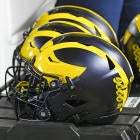Will it be BCS II?
That’s the key question as the details of a college football playoff will continue to be ironed out Monday in Denver. That’s when the BCS commissioners and BCS Presidential Oversight Committee next meet to discuss the biggest issue remaining on the table: access for the so-called Group of Five.
The basics have basically been decided: A six-bowl rotation over 12 years with each bowl hosting a national semifinal four times over that period. The money will be obscene. CBSSports.com reported last week that an early price point from ESPN is close to $500 million per year. That’s approximately three times the value of the current BCS.
But will the new system be fairer than the old BCS? How much of the revenue windfall will go to the Group of Five, the so-called non-automatic qualifier conferences that will provide the least value to the package beginning in 2014 -- Big East, Conference USA, Sun Belt, MAC and Mountain West? Currently, 15 percent of the BCS money goes to that Group of Five which currently includes the WAC instead of the Big East.
Fifteen percent of $500 million is $75 million. But even that doesn’t compare equitably; power conferences like the Big Ten and SEC may soon be pulling in $30 million per school each year.
“At some point how far are the five willing to go to be treated as equal citizens?” one source familiar with the discussions asked.
The last time we were at this point in 2003, Tulane president Scott Cowen gained more access for the non-AQs with the threat of Congressional intervention. An awkward fifth BCS game was added to provide more access for non-AQs.
This time the issue continues to be access and money as the BCS reinvents itself. The system has always been confident of its legal standing. Example: There would be no Boise State or Utah Cinderella stories without the BCS. In fact, Utah attorney general Mark Shurtleff recently withdrew his attempt to sue the BCS on anti-trust grounds.
In the playoff, a human committee will decide the top four teams that will participate in a bracketed playoff. Beyond that, the committee will also select and place the teams in the other bowls. The structure of the committee hasn’t been decided, although it is expected that at least one representative from each FBS conference will be represented.
Complicating the issue is that in given years, conceivably only two open spots (out of 12) could exist for the Group of Five to chase. A threshold -- say, top 25 -- has been discussed as an access point for the best of those schools. Using the current rankings, No. 19 Louisiana Tech would be that team if this were 2014. (In the current BCS, the Bulldogs are not yet assured of an automatic spot.)
Also:
• While ESPN currently has an exclusive 30-day negotiating window, it can still negotiate even if that window expires. In fact, the Worldwide Leader remains the overwhelming favorite. One source said that in a previous agreement, the four-year deal with ESPN in the early days of the BCS wasn’t signed until the last game of the deal had been played. In other words, it is a very casual negotiation.
• A Kansas City sports marketing firm, Premier Sports Management, has been hired to rebrand the BCS. That includes coming up with a new name to replace Bowl Championship Series.
• Oregon State president Ed Ray will replace USC president Max Nikias as the Pac-12 rep on the oversight committee this week. The significance: Ray also happens to be chairman of the NCAA’s executive committee which in July signed off on and helped develop the Penn State penalties. The oversight committee is expected to meet with the commissioners after lunch on Monday.
• The so-called “contract” bowls have been decided. The Rose, Sugar and Orange are owned by the power conferences (Big Ten, Pac-12, Big 12, SEC, ACC) and Notre Dame. To be decided is the site of three other “access” -- or open -- bowls. In the running for those bowls are Phoenix (Fiesta), Atlanta, Dallas and Orlando.




















